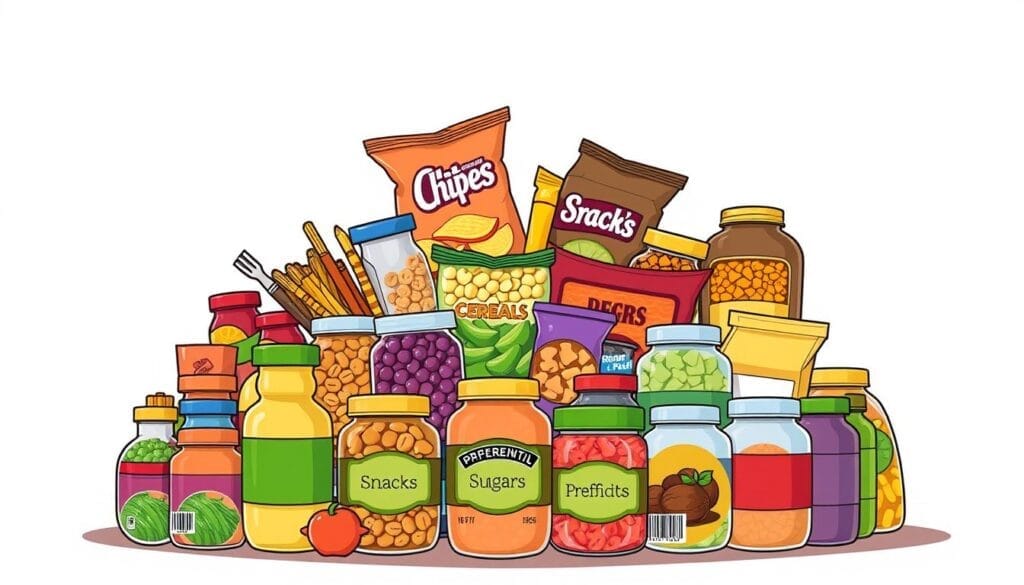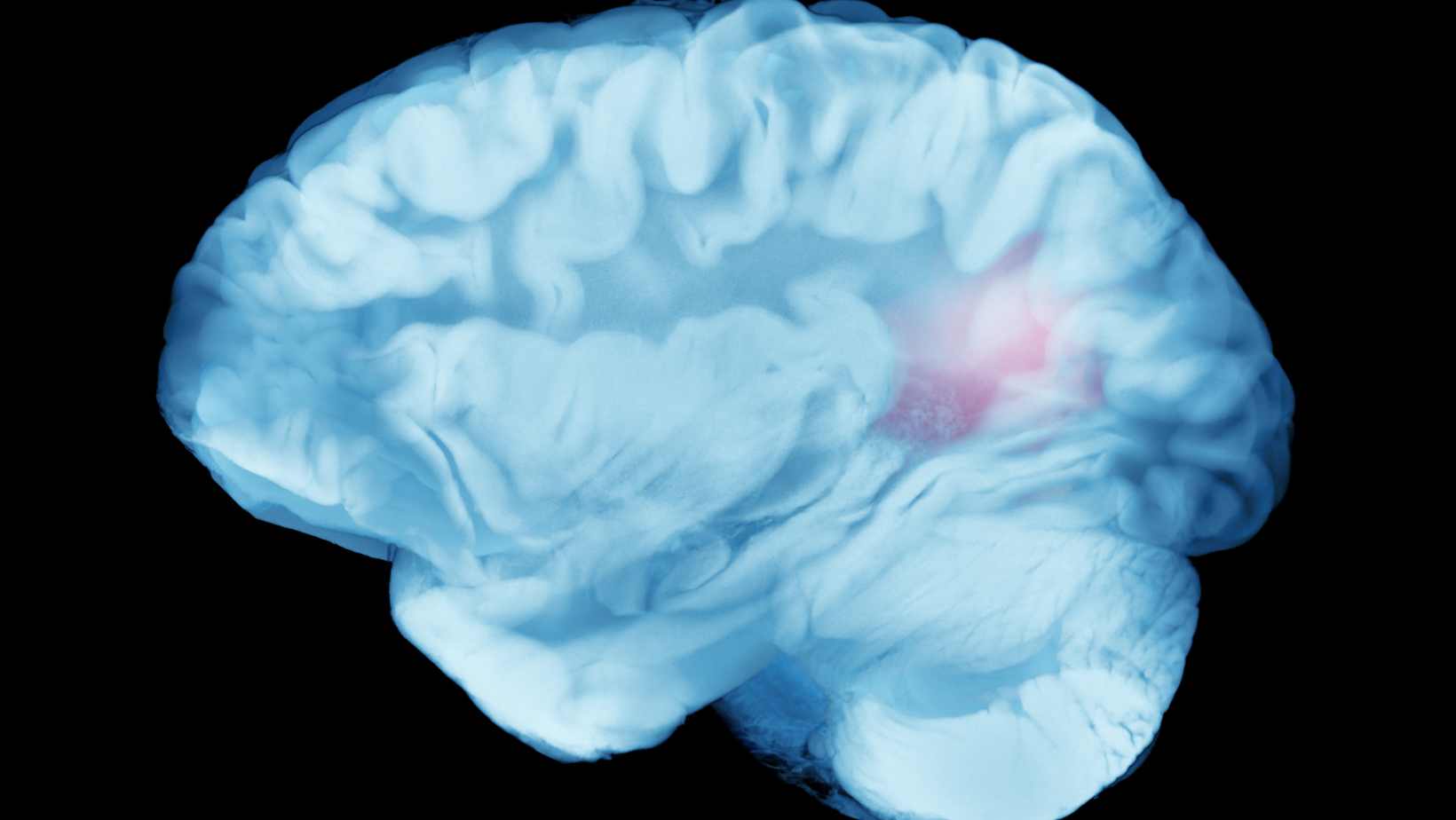Neurological disorders can greatly affect a person’s health and happiness. Diet is key in managing these conditions. Foods high in sugar, unhealthy fats, and artificial additives can harm the brain and worsen symptoms.
This article will look at foods to avoid for better brain health. It aims to help manage neurological conditions more effectively.
Dementia is expected to affect over 65 million people worldwide by 2030. This shows how important diet is for brain health. Sugary drinks, for example, contain high-fructose corn syrup.
High-fructose corn syrup has 55% fructose and 45% glucose. Too much fructose can cause obesity, high blood pressure, and diabetes. These issues can harm the brain.
The blood-brain barrier protects the brain. But, some foods can damage it, letting harmful substances in. This can lead to neurological disorders.
Studies show that too many carbs can increase the risk of dementia. Elderly people who eat more carbs have almost double the risk. This highlights the need to watch carb intake.
Table of Contents
ToggleUnderstanding Neurological Disorders and Diet
Diet is key to our brain health. Some foods can make symptoms worse or raise the risk of neurological disorders. Knowing how diet affects our brain can help us make better choices.
The Connection Between Diet and Neurological Health
Bad fats, sugars, and processed foods can lead to inflammation and stress in the brain. But, eating anti-inflammatory foods like those in the Mediterranean diet can help. This might lower the risk of diseases like Alzheimer’s and Parkinson’s.
Common Neurological Disorders Affected by Diet
- Alzheimer’s disease: Eating foods rich in omega-3s, antioxidants, and anti-inflammatory compounds may slow it down.
- Parkinson’s disease: Eating plant-based foods, whole grains, and healthy fats can help manage symptoms.
- Multiple sclerosis: An anti-inflammatory diet and certain nutrients might reduce inflammation and symptoms.
- Epilepsy: The ketogenic diet, with lots of fat and little carbs, can help control seizures in some cases.

Understanding diet’s role in brain health lets us make choices that support our brain. This can help lessen the impact of these conditions.
Foods High in Sugar
Sugary treats might taste good, but too much sugar is bad for your brain. Research shows that too much sugar can hurt memory and learning. It can even lead to dementia. Drinks like soda and fruit juice are especially bad because they have a lot of fructose.
Impact of Sugar on Brain Function
Sugar makes dopamine, a chemical that makes us feel good. This can make us want more sugar, leading to unhealthy eating habits. Also, sugary foods can cause inflammation, which is bad for our brains and overall health.
Alternatives to Sugary Foods
- Choose water, unsweetened tea, or low-sugar drinks instead of sugary ones.
- Eat fresh fruits, veggies, or nuts to satisfy cravings and get important nutrients for your brain.
- Try healthy sugar substitutes like honey, maple syrup, or stevia in small amounts.
- Eat more whole, unprocessed foods to cut down on added sugars.

By choosing to eat less sugar and picking healthier options, you can help keep your brain sharp. This can also lower the chance of brain diseases linked to too much sugar.
Processed Foods and Preservatives
Foods we eat are key to our brain health. Processed foods often have bad stuff like artificial additives and preservatives. These can hurt our brain’s function.
These foods are full of calories, unhealthy fats, and sugars. But they lack the good stuff our bodies need. Eating too much of these foods can lead to brain problems and memory loss.
Studies show that eating too much processed food is bad for our brains. It can cause memory loss and other brain issues.
Common Additives to Avoid
Some bad additives in processed foods include artificial sweeteners and MSG. Food dyes are also a no-go. These can harm our health, especially our brains.
Healthy Alternatives to Processed Foods
- Eat more whole foods like fruits, veggies, lean proteins, and grains.
- Choose clean eating with lots of whole foods and less artificial stuff.
- Try making your own food with natural ingredients. It’s good for your brain and health.
By picking whole foods over processed ones, you help your brain. You also lower the risk of health problems from artificial additives.

Trans Fats and Saturated Fats
The fats we eat can really affect our brain health. Eating too much of trans fats and saturated fats can raise the risk of brain diseases. This includes Alzheimer’s disease and losing brain function.
How Fats Affect Brain Health
Eating a lot of trans fats can hurt your memory and increase the risk of Alzheimer’s. Trans fats are in fried foods, baked goods, and processed snacks. They cause inflammation and mess with the brain’s work.
While the science on saturated fats is not clear, it’s wise to eat less of them. They might also harm brain health.
Sources of Healthy Fats
We should eat more healthy fats, especially omega-3 fatty acids. Omega-3s help keep the brain healthy and fight off brain decline. Here are some good sources:
- Fatty fish, such as salmon, mackerel, and sardines
- Nuts and seeds, like walnuts, chia seeds, and flaxseeds
- Avocados
- Olive oil
Choosing the right fats can help our brain work better. It also lowers the chance of brain diseases.

Gluten and Its Effects
Not everyone with neurological disorders must avoid gluten. But those with gluten sensitivity or celiac disease should. Symptoms include brain fog, headaches, and neuropathy.
Understanding Gluten Sensitivity
Celiac disease, wheat allergy, and non-celiac gluten sensitivity (NCGS) are gluten-related disorders. Celiac disease can cause serious health issues like anemia and stunted growth. Wheat allergy leads to allergic reactions and needs a wheat-free diet.
People with celiac disease and NCGS must avoid all gluten. This means no gluten-containing foods.
Gluten-Free Alternatives to Consider
Grains to avoid include wheat, barley, rye, and triticale. Also, farina, spelt, kamut, wheat berries, farro, and couscous. Commonly avoided foods include most breads, crackers, wraps, and baked goods.
Also, wheat-based pastas, certain snack foods, and processed foods are off-limits. But, there are many gluten-free foods to enjoy. Fruits and vegetables, legumes, and gluten-free grains are good choices.
Animal proteins, nuts, seeds, and healthy fats are also safe. Look for brands like Simple Mills, Purely Elizabeth, and Jovial Foods for gluten-free options.
When eating out, choose protein sources and gluten-free grains. Avoid fried foods and check the menu for gluten-free options. Bringing your own salad dressings is a good idea.
Alcohol Consumption
Too much alcohol can harm your brain a lot. It messes with how your brain talks to itself. This can cause memory problems, confusion, and raise the risk of brain diseases. Drinking in moderation might help some, but it’s wise to keep it low.
If you have a brain disorder, talk to your doctor about drinking. Even a little alcohol can mess with your meds or make symptoms worse.
Effects of Alcohol on Neurological Health
Drinking too much can hurt your brain a lot. It can lead to many brain problems. For example, up to 46% of people with alcohol-related myopathy see their strength go down a lot.
Also, drinking too much can damage the part of the brain that helps you walk and talk right. This can cause you to walk funny, shake, slur words, and move in jerky ways.
Recommended Guidelines for Alcohol Intake
Drinking a little might be good for you, but know the limits. Health experts say women should have no more than one drink a day. Men can have up to two.
But if you have a brain problem, see a neurologist first. They can tell you how much alcohol is safe for you. This way, you won’t make your brain problems worse.
Caffeine and Neurological Disorders
Caffeine is a popular stimulant. The average American adult drinks about 179 mg of it every day. This is like drinking two cups of coffee. While it can help with thinking, too much can be bad for some people.
The Risks of High Caffeine Intake
Drinking more than three cups of coffee a day can cause problems. These include anxiety, trouble sleeping, and shaking. People with Parkinson’s disease are especially at risk.
Too much caffeine can even cause poisoning. This leads to many symptoms in the brain.
Some genes make people more likely to get Alzheimer’s disease. This is true for menopausal women. Also, some genes can raise the risk of Parkinson’s disease in men.
Alternatives to Caffeinated Beverages
- Herbal teas: Herbal teas like chamomile, valerian, and lavender can provide a soothing, caffeine-free alternative to traditional caffeinated beverages.
- Decaffeinated coffee: For those who enjoy the taste of coffee, decaffeinated options can offer the flavor without the stimulant effects.
- Caffeine-free energy drinks: Beverages made with ingredients like green smoothies, coconut water, or yerba mate can provide a natural energy boost without the potential drawbacks of high caffeine consumption.
Research on caffeine and brain health is not all the same. But, people with brain disorders should be careful with caffeine. Trying other drinks and drinking less can help. This way, they can still enjoy caffeine’s good effects but avoid its bad ones.
Dairy Products: What You Need to Know
For people with neurological disorders, dairy might be a problem. Lactose or casein, the main proteins in dairy, can cause inflammation. This can make symptoms worse. Dairy is good for nutrients, but it’s not for everyone with neurological issues.
Potential Issues with Dairy
Research shows dairy, especially low-fat kinds, might raise Parkinson’s disease risk. The proteins in dairy could cause inflammation. Some studies found dairy might slightly increase Parkinson’s risk in both men and women.
Non-Dairy Alternatives
- Plant-based milks like almond, soy, or oat milk are good for those with lactose intolerance or casein sensitivity.
- Dairy-free yogurts and cheeses made from nuts or soy are also options.
- These plant-based milk alternatives have nutrients like regular dairy but don’t trigger neurological symptoms.
People with neurological disorders should watch what they eat. If they think dairy is a problem, they should cut it out. Talking to a doctor about diet changes can help manage their condition.
Importance of a Balanced Diet
Eating a balanced diet is key for keeping your brain healthy. Eating foods rich in nutrients helps your brain work well. It may also lower the chance of getting brain diseases.
Key Nutrients for Neurological Health
Good for your brain are omega-3s, antioxidants, B vitamins, and vitamin D. Omega-3s, found in wild salmon, help your brain. Antioxidants in turmeric and berries fight stress and help your brain grow.
B vitamins and vitamin D are important for energy and protecting your brain.
Tips for Maintaining a Healthy Diet
To eat well for your brain, plan your meals and cook at home. Try to eat foods that are full of nutrients. The Mediterranean diet and MIND diet are good for your brain. They include whole grains, lean proteins, fruits, veggies, and healthy fats.
Choosing the right foods helps keep your brain healthy. It’s a way to take care of your brain.
FAQ
What is the connection between diet and neurological health?
Diet is very important for our brain health. Some foods help our brain work well. Others can make neurological problems worse. Eating right can help our brain stay healthy.
What are some common neurological disorders affected by diet?
Diet affects many brain diseases. These include Alzheimer’s, Parkinson’s, multiple sclerosis, and epilepsy. Bad fats, sugars, and processed foods can increase the risk of these diseases.
How does excessive sugar intake affect brain health?
Too much sugar harms our brain. It can make memory and learning hard. It also raises the risk of dementia. We should eat less sugar and choose healthier drinks.
What types of processed foods and additives should be avoided?
Avoid foods with bad additives. These include artificial sweeteners and MSG. Instead, eat whole foods like fruits, veggies, and lean proteins.
How do trans fats and saturated fats affect the brain?
Trans fats are bad for our brain. They increase Alzheimer’s risk and harm memory. Saturated fats are not as clear, but healthy fats like omega-3s are good for our brain.
Can gluten sensitivity or celiac disease cause neurological symptoms?
Yes, gluten can cause brain problems for some. Symptoms include brain fog and headaches. People with gluten issues should avoid gluten and choose gluten-free foods.
How does excessive alcohol consumption affect neurological health?
Too much alcohol harms our brain. It can cause memory loss and confusion. It’s best to drink less, especially if you have brain diseases.
What are the potential risks of high caffeine intake for individuals with neurological disorders?
Too much caffeine can be bad for brain health. It can make anxiety worse and disrupt sleep. Try herbal teas or decaf coffee instead.
Can dairy products be problematic for those with neurological disorders?
Some people with brain issues may react to dairy. Dairy can cause inflammation. Try non-dairy options like plant-based milk and yogurt.
What are the key nutrients for supporting neurological health?
Our brain needs omega-3s, antioxidants, B vitamins, and vitamin D. Eating a balanced diet helps our brain stay healthy. Focus on whole foods and healthy fats.

Dr Chandril Chugh
Dr. Chandril Chugh, a renowned American Board-Certified Neurologist, is just a click away. With years of global experience, he offers trusted neurological guidance online.
→ Book a consultation to discover which remedies suit your needs best.




